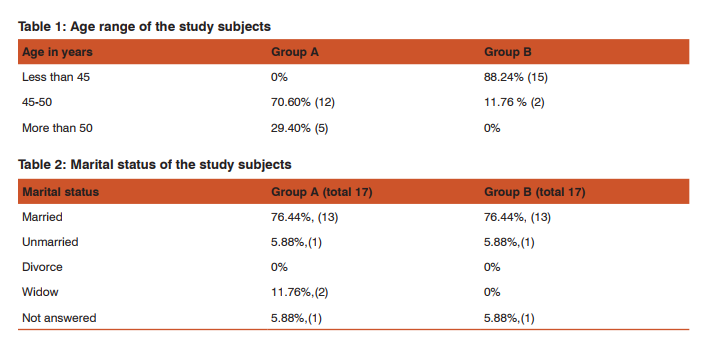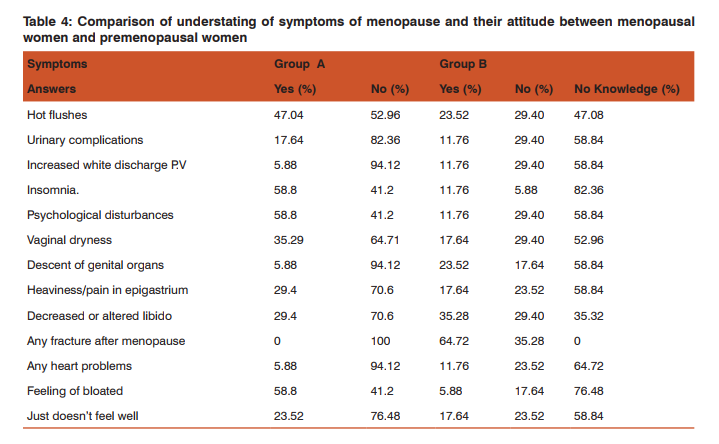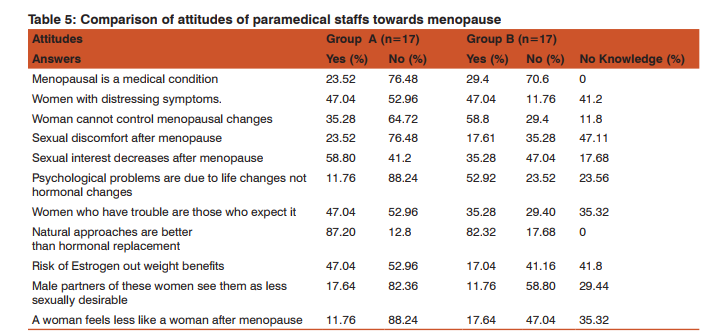IJCRR - 8(7), April, 2016
Pages: 08-12
Date of Publication: 12-Apr-2016
Print Article
Download XML Download PDF
KNOWLEDGE OF QUALIFIED PARAMEDICAL STAFFS IN UNDERSTANDING THE SYMPTOMATOLOGY AND HORMONAL REPLACEMENT THERAPY IN MENOPAUSE
Author: Umakant Valvekar, S. Viswanathan
Category: Healthcare
Abstract:Background: Menopause is a hormonal depletion state which may lead to psychosomatic condition where it needs psychological support by family members. Most menopausal women go untreated. It is better to have physician's advice in some cases for normal life style. The awareness of menopause and hormonal replacement therapy (HRT) was low among paramedical staff. Methodology: A survey was conducted in 34 women paramedical staff members of Karpaga Vinayaga Institute of Medical Sciences and Research Centre, Tamil Nadu, India. The survey was about the knowledge of women paramedical staff in understanding vasomotor, psychosocial, physical, sexual changes and hormonal replacement therapy (HRT) in menopausal women. The study subjects were divided into two groups as menopausal group (group A) and premenopausal group (group B) consists of 17 subjects in each group. Results: In the present study most menopausal group (group A) women answered that they had experienced hot flushes, insomnia, psychological disturbances, bloated feeling as major symptoms. In this survey most of the paramedical women staff members of menopausal group replied that there was a decrease in the sexual interest in them and they felt natural approaches are better than replacement therapy. Whereas majority of women from premenopausal group (group B) opinioned that sexual interest does not decrease even after menopause. However, they expressed similar opinion as that of menopausal women for the natural approach of menopause is better than hormonal replacement therapy. Conclusion: Awareness of the menopause and HRT is low even among the paramedical staffs. This clearly suggests that there is need to change the attitude of a common woman towards menopause. This can be done by conducting awareness programs on menopause and hormonal replacement therapy (HRT) to paramedical staffs and general public.
Keywords: Attitude, Knowledge, HRT, Symptomatology of menopause, Nursing staffs and Medical technicians
Full Text:
INTRODUCTION When a woman stops menstruating, then it is termed as menopause. It is a natural event, not a disease or illness. However, for some women the physical and emotional symptoms can be difficult1 . Menopause involves hormonal changes that may cause physical symptoms. For some women, menopause may bring on feelings of sadness1 . As per a study done by Sengupta2 in 2003, more than 130 million women in India would have reached menopause by 2016. Menopause is an unspoken, unattended reality of woman, which can last 1/3rd phase of her life2 . Various types of menopausal symptoms include vasomotor, psychosocial, physical and sexual1 . 60% of post-menopausal women will experience mild symptoms, 20% severe and another 20% no symptoms3, 4.
With literacy, increasing age expectancy, urbanization, health consciousness, rapid globalization, internet, health education on T.V and improved economic conditions, menopause is emerging important health issue. Changes taking place in post-menopause are also new issues. Symptoms recognized early can help in reducing discomfort and fear3, 4. Mean age for attaining menopause is 44-45 years in developing countries and 48.2 years in developed countries. Under reporting of symptoms in India is due to socio-cultural features.
Menopause and related changes in the hormone also cause symptoms which are affected on the quality of life, such as night sweats, sleep disturbances, hot flushes, vaginal dryness, urinary frequency, poor memory and depression3-5. Hormonal replacement therapy (HRT) is the effective management to menopausal symptoms and may prevent women from increased osteoporosis and also decreases the cardiovascular risk3-5.
MATERIAL AND METHODS The present survey was conducted at Karpaga Vinayaga Institute of Medical Sciences and Research Centre, a tertiary care centre with teaching hospital in Kanchipuram district of Tamil Nadu. Aim of the study was to find out the attitude, symptomatology, knowledge of menopause and HRT in our paramedical staff members i.e. qualified nursing staffs and medical technicians. Total of 34 women working at our hospital in different clinical departments were selected for the study. Study subjects were divided into two groups i.e, group A and group B; Group A being post-menopausal women and the age of all the subjects were more than 45 years.
The other group is, group B being pre-menopausal women and they are all in reproductive age group only. Each group consists of 17 subjects. Details of age, marital status, and duration of menopause experience of both the groups were mentioned in table 1, table 2 and table 3 respectively. By using a pre designed and tested questionnaire we collected the information about their medical history, current or past history of hormonal treatment, alternative treatment, signs and symptoms of osteoporosis and cardio-vascular diseases, dietary and life style changes were noted down carefully.
No woman had any mental problems, or was on neither any anxiolytics, anti-depressants nor any recent mishap/trauma. Comparisons were made between premenopausal and postmenopausal women. Data storage, analysis, statistics summary and chi square tests were carried out using a standard statistical package. Data was expressed in percentage. Pre menopausal women were included for the study because they could help in identifying the gap in the knowledge, understanding and differences in attitude.
RESULTS Details of age and marital status of the subjects in group A and group B was given in table 1 and table 2 respectively. Out of 17 women selected for the study in group A, four women (23.52%) were had the duration of the menopause less than one year, four (23.52%) women had 1 to 2 years of menopausal duration, another four women (23.52%) had 2 to 5 years menopausal duration, and other 5 (29.4%) women had more than five years of menopausal duration (table 3).
In the present study most menopausal group (group A) women answered that they had experienced hot flushes (47.04%), insomnia (58.8%), psychological disturbances (58.8%), bloated feeling (58.8%) as major symptoms (table 4). While assessing the attitudes of the paramedical women staff members of menopausal group (group A), 58.80% of them were answered that there was a decrease in the sexual interest in them. This may be because of dryness of vagina. Further 87.20% of the women felt natural approaches were better than hormonal replacement therapy. Majority of women from premenopausal group (group B) opinioned that sexual interest does not decrease even after menopause (table 4). However, they expressed similar opinion as that of menopausal women for the natural approach of menopause is better than hormonal replacement therapy. In group A, 58.80% women experienced that sexual desire was decreased after menopause, 23.52% had sexual discomfort.
About 47 % of women from group B did not answer about the attitudes towards sexual life after menopause as they had yet to attend menopause. More than 50% of women in both the groups were having the impression of psychological changes were physiological or due to ageing but not hormonal. Most interesting thing was that women of both the groups (group A = 47% and group B = 35.28%) think that those who suffer from the changes are those who expect it. About 47% of women of both the groups think that the risk of estrogen treatment outweighs the benefit. Further, women of both groups (group A = 87.2%; group B = 82.32%) think that natural approach is always better than hormonal replacement therapy in menopause; they say natural is natural (table 5). In answering about their male partner has reduced sexual desire after menopause, 17.64 % in group A and 11.76% in group B think so.
This clearly suggests that their male partner having normal sexual feeling even after their menopause. In the present study post-menopausal women had insomnia in 58.8%, pain in upper abdomen in 29.4% and psychological disturbances 58.8% (table 5 and table 6). The association between reported symptoms and attitude towards menopause and HRT was found to be statistically significant (p <0.05). Premenopausal group women hesitated to answer questions related to sexual interest, discomfort and their husband’s attitude towards libido, women as less feminine, or they themselves feel less feminine or attractive after attaining menopause, reasons being shy, no knowledge or have yet to attain menopause.
DISCUSSION Menopause is the stage where frequent social and hormonal characteristic changes occur in a woman6 . As life expectation increasing, most of the women are attending menopause. HRT can have significant profit in postmenopausal women. As of now, hormonal replacement therapy utilization in menopause women was very low. Menopause awareness is the key analyst of hormonal replacement therapy use4, 7. Women approach regarding menopause are powerfully predisposed by social, cultural and economical situations in that’s they live and also reproduce the dissimilarity in modes of management for or perceptions of its symptoms7 .
Symptoms of the menopause are experimented in all over countries of the world but incidence varies from place to place. In the present study 47.04% of women from menopausal group experienced hot flushes, 17.6% women had urinary complications, 5.88% women had increased white discharge, 35.29% women experiencing vaginal dryness and 29.4% experienced altered libido. The similar results were reported by Porter3 , et al. 1996, Ferguson8 , et al. 1989, Mahajan9 , et al. 2012, Bairy and Shalini10 et al. 2009. Further Mahajan study revealed hot flushes and night sweats are miss-interpretated in India9 . Ferguson8 et al. in 1989, in their survey reported 51% hot-flushes, 28% experienced vaginal dryness, 14% insomnia, 9% depression, 7% just didn’t feel well.
In a survey done by Porter3 in 1996, reported that 57% postmenopausal women experienced various symptoms as, hotflushes (22%), psychological (25%). Bairy 10 et al., in Udipi from South India recorded in their study that aches in muscles and joints 67.7%, tiredness 64.8%, poor memory 60.5%, low back-ache 58.80%, feeling bloated 55.1% and disturbed sleep (insomnia) 51.1%. In a study done by Sengupta2 in 2003, it was reported that most menopausal women go untreated or use unproven alternative therapies as there is unavailability or ever-increasing cost of the medicines and also lack of social support. In the present study, about 47.04% women in menopausal group (group A), had felt that women with more negative attitudes towards the menopause suffer more and 35.28% women from group B (Premenopausal women) had expressed same kind of opinion. This is in line with the other studies done by Bairy et al10 2009, Saka et al11., 2012, Puri et al.,12 2007.
From the research study done by Singh and Arora5 in 2005, on profile of menopausal women in rural North India, found that women view menopause positively but HRT use was low. In another study done by Saka et al11 2012, from Nigeria revealed that poor menopausal knowledge among common women. In this study more than half of the respondents reported negative attitude towards menopause. Most researches4,7,8,9,12,13 have sounded alarm about lack of information for women about the changes they can expect and absence of positive images of aging related to menopause and HRT. Mehershi et al14., 2010 in their study, stated that 85% of gynecologists from Jaipur, Rajasthan give HRT to their parents. Hence, HRT can have a great deal to offer or improve quality of life a woman who has reached natural menopause, have family history of osteoporosis, or undergone hysterectomy or who are currently ignorant of HRT8,10,13.
Changes of menarche are valued and welcomed, as against for menopause is surrounded by secrecy and shame and often signal of end of valued state of reproductively and femininity14. In our study though being paramedical by profession their awareness of menopause and HRT is low, which reflexes general Indian population will still be poorer in awareness. Doctors and health workers must make patients aware of menopause and HRT and also of benefits and side-effects. Decision whether to take or not to take HRT is choice given to them. As most menopausal women go untreated or use unproven alternative therapies as there is unavailability or ever increasing cost of the medicines and also lack of social support systems.
CONCLUSION This study concludes that most of the paramedical women staffs lacked knowledge regarding menopause and hormonal replacement therapy. Mostly ideas of the women participated in this study concerning menopause knowledge were such as; “it is natural thing and needs no medical assistance”. This type of attitude gives negative impression to take hormonal therapy in menopause. Hence education and awareness in women about menopause and hormonal therapy (HRT) can improve the general health of a woman.
ACKNOWLEDGEMENTS We would like to thank all the paramedical staff who had participated in the study. Funding: We did not receive any external funding for this study. Conflicts of Interest: There is no conflict of interest Ethical approval: Not required





References:
1. Al-Azzawi F, Palacios S. Hormonal changes during menopause. Maturitas. 2009; 63(2):135-137.
2. Sengupta A. The emergence of the menopause in India. Climacteric.2003; 6:92 -95.
3. Porter M, Penney GC, Russell D, Russell E, Templeton A. A population based survey of women’s experience of the menopause. Br J. Obst. Gynaecol 1996; 103(10); 1025 – 1028.
4. Shaheen S, Mahmood A, Kadri F. Menopause and HRT; Clinical pattern and awareness. Professional Med J. 2015; 22(7)904-909.
5. Singh A, Arora AK. Profile of menopausal in rural North India. Climacteric. 2005; 8(2):177-184.
6. Pam HA, Wu MH, Hsu CC, Yao BL, Huang KE. The perception of menopause among women in Taiwan. Maturitas 2002; 41:269 – 274.
7. Jin Yong Lee, Chang Suk Suh. The attitudes of postmenopausal women towards hormone replacement therapy (HRT) and effects of HRT on lipid profiles. Proceedings of the first consensus meeting on menopause in East Asian region, 1997; May 26 – 30.
8. Ferguson KJ, Hoegh C, Johnson S. Estrogen replacement therapy: a survey of women’s knowledge and attitudes. Arch Intern Med. 1989; 149:133 – 136.
9. Mahajan N, Aggarwal M, Bagge A. Health issues of menopausal women in North India. J. Midlife Health, 2012; 3:84-87.
10. Bairy L, Shalini A, Bhat P, Bhat R. Prevalence of menopausal symptoms and quality of life after menopause in women from South India. Aust N Z J Obstet Gynaecol. 2009; 49:106–109.
11. Saka MJ, Saidu R, Jimoh A, Akande T. Behavioral pattern of Menopausal Nigeria women. Ann. Trop Med. and Public Health. 2012; 5(2): 74-79.
12. Puri S, Bhatia V, Mangat C. Perceptions of Menopause and Postmenopausal Bleeding In Women of Chandigarh, India. The Internet Journal of Family Practice. 2007; 6(2):1- 6.
13. Nedrow A, Miller J, Walker M, Nygren P, Huffman LH, Nelson HD. Complementary and alternative therapies for the management of menopause related symptoms: A systematic evidence review. JAMA. Arch Intern Med. 2006; 166(14):1453-1465.
14. Meherishi S, Khandelwal S, Swarankar ML, Kaur P. Attitudes and practices of gynecologists in Jaipur towards management of menopause. J. Midlife health, 2010; 1(2):74-78.
|






 This work is licensed under a Creative Commons Attribution-NonCommercial 4.0 International License
This work is licensed under a Creative Commons Attribution-NonCommercial 4.0 International License